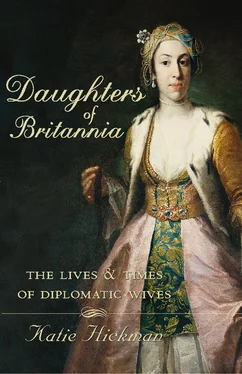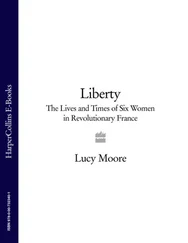As befitted his status as ambassador, Richard travelled in the principal gilded state coach, which was lined with crimson velvet and fringed with silver and gold. Ann followed behind in a second, green-velvet-lined coach. Many gentlemen, perhaps including the gallant Duke of Albuquerque, rode in front and Ann’s pages, dressed in matching green velvet liveries, rode behind her. Numerous coaches, litters, riding horses, and a string of covered wagons decorated with the Fanshawe coat of arms and carrying their trunks and clothes, brought up the rear. Along the way they were lavishly fêted, entertained with banquets, plays, comedies, music and juegos de toros (bullfights). In the King’s palace in Seville, where they stayed briefly, Ann was presented with a pet lion. ‘Yet I assure you,’ she claimed, not wholly convincingly, in the memoir written for her only surviving son, ‘… that your father and myself both wished ourselves in a retired country life in England, as more agreeable to both our inclinations.’
And yet, while she remained in Spain, everything about the country seemed marvellous; better, in fact, to her dazzled eyes, than anything she had ever encountered in England.
Our house was very richly furnished, both my husband’s quarter and mine, the worst bed and chamber of my apartment being furnished with damask, in which my chambermaid lay; and all the chambers through [out] the floor of them, covered with Persia carpets. The richness of the gilt and silver plates which we had in great abundance, as we had likewise all sorts of very fine household linen, was fit only for the entertainment of so great a prince as his majesty our master. *
In fact everything she saw or experienced in Spain, even the food, was fit only for kings.
There is not in the Christian world better wines than their midland wines are especially, besides sherry and canary. Their water tastes like milk; their corn white to a miracle; and their wheat makes the sweetest and best bread in the world. Bacon, beyond belief good; the Segovia veal much larger, whiter and fatter than ours. Mutton most excellent; capons much better than ours … The cream called nata is much sweeter and thicker than ever I saw in England. Their eggs much exceed ours and so all sorts of salads and roots and fruits. That I most admired is melons, peaches, bergamot pears and grapes, oranges, lemons, citrous, figs, pomegranates … And they have olives which are nowhere so good. 11
As the travelling dust gradually settled, and the last fanfares died away, the blurred kaleidoscope of first impressions gradually gave way to a more measured appreciation of the conditions in store. The house which Ann Fanshawe was to preside over for the next two and a half years, the Casa de las Siete Chimeneas (the House of the Seven Chimneys), with its rich damask hangings, Persian carpets, gilt and silver plate, was one of the grander British residences abroad, but others found that they could be just as happy in more modest surroundings.
In the 1950s Maureen Tweedy was posted to Meshed, near the Persian border with Russia, a place of pilgrimage for Sharia Muslims and the burial place of Harun-al-Rashid, Caliph of Baghdad, a name exotically linked with The Thousand and One Nights. For Maureen the consulate there, still redolent of the last days of the Raj, had a romance all of its own, and ‘the quietude of a purely English setting’. Despite its rudimentary Russian heating system and ‘our old friend from Indian days, the thunderbox’ as the only sanitation in their bathroom, she loved the house: it was a large, square, two-storeyed building with green shutters and wide deep verandas all round it, standing in a beautiful garden shaded by great walnut trees. ‘A sweep of lawn, flanked by herbaceous borders, led to the rose garden. Beyond were two tennis courts and beyond these again a formal lily pond, a swimming pool brooded over by an ancient mulberry tree, an enormous kitchen garden, and peach and apricot trees heavy with fruit.’ Their servants, ‘elderly Indian orderlies, grown old in the service of the British’, stood stiffly to attention as the Tweedys drove through the gates. In addition to the five indoor servants, and five gardeners, their household included an aged Pakistani syce, or groom. Although the consul no longer kept horses, the syce still made sure that all the saddlery was in perfect condition, and was fond of reminiscing about the days when the Russian consul general never went anywhere without his Cossack guards, nor the British without an escort of Indian cavalry. 12
Similarly, when Diana Shipton, Maureen’s contemporary, arrived in Kashgar in 1946 she found the British consulate a rich repository of memories from other lives. There were photographs in the drawing room, ‘a store full of horns and heads from many shooting trips’, a game book, beautifully printed and bound, and another notebook in which to record sightings of birds and their migration. There was also a good collection of gramophone records, including everything from complete symphonies to old dance tunes. The greatest legacy was the library, which contained an eclectic collection of over 300 books, from improving tomes like The Life of Mohammed, Arithmetic in the Mongol Language and twelve volumes of the Encyclopaedia of Religion and Ethics , to the more wistful Hunting Insects in the South Seas. 13
Other women found themselves considerably less well equipped. Catherine Macartney, the first woman to inhabit the Kashgar consulate, found no such luxury when she arrived there in 1898. The original building was little more than a ‘native dwelling’ built in traditional style around a courtyard. The walls were of sun-baked brick and mud, and there were no windows, only skylights covered not with glass (which had not yet reached that part of the world) but with oiled paper. ‘Our furniture was very primitive,’ Catherine wrote stoically, since most of it had been home-made by her husband, who had no very great experience of designing comfortable chairs. His first attempt ‘was so high that I had almost to climb up to the seat, and must sit with my feet on the rail, or with them dangling. The back was quite straight and reached far above my head, and the seat was not more than about six inches wide. There was no possible chance of having a rest in it …’ 14
In 1947, when Masha Williams first arrived in Baghdad during the ferocious summer heat, she found that none of her heavy luggage had arrived, although her fur coat had been sent from the cleaners at Harrods. In the house itself there were no curtains, and no furniture (the office, which provided them with an allowance, expected them to buy these things for themselves) and, worst of all, no refrigerator or fans.
The culture, customs or politics of a particular country could also impose their own particular living restrictions. Sheila Whitney speaks for all the diplomatic wives who experienced communist regimes.
It was quite tough. We weren’t allowed to move more than a twelve-mile radius from the centre of Peking. If you wanted to go any further you had to ask permission. And the Ming tombs were just about within that twelve-mile radius so you could go there. But when you did there was always a little man on a motorbike with a boiler suit watching you. You weren’t allowed to diversify off the main route to anywhere, so you didn’t see any of the little villages, and suddenly you got two or three miles outside Peking and this little chap would appear on his bike. And he would follow you to the Ming tombs and, wherever you were, you would see him in the bushes.
Peggy Trevelyan’s experience in the Soviet Union in the early 1960s was also typical. ‘One had to presume our house was bugged. So if ever my husband wanted to tell me about anything – not that he told me much because he thought it was better that I didn’t know – but if there was anything pertaining to individuals in the embassy that he thought I should know, we used to go for a walk in the botanical gardens.’
Читать дальше












